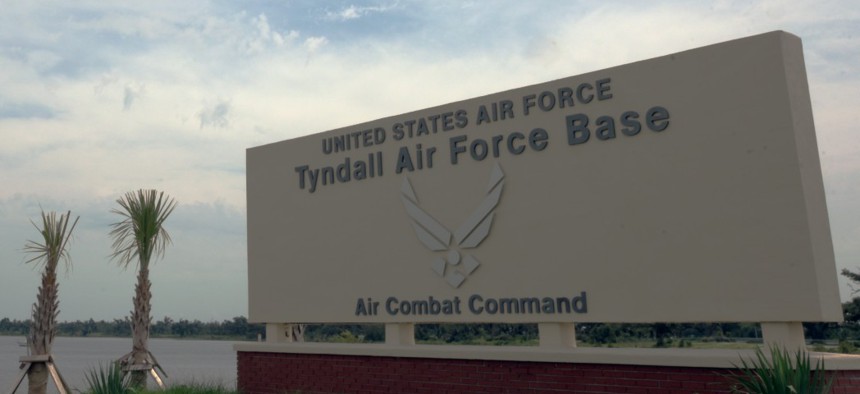5G is ‘Going Live’ at Tyndall Air Force Base

Staff Sgt. Magen M. Reeves/U.S. Air Force
Verizon’s next-gen communications capabilities will enable emerging technologies—and enhanced streaming for personnel.
Nodes enabling Verizon’s 5G ultra wideband coverage are going live at Tyndall Air Force Base in Florida, Nextgov confirmed this week, marking a key step in the Defense Department’s robust initiative to test and deliver next-generation communications technologies.
“‘Going live’ or ‘turned on’ refers to the small cell wireless facility being on-air, meaning it is propagating a signal/transmitting,” Tyndall Real Property Accountable Officer Jody Reed told Nextgov in an email on Wednesday.
Networks that run on 5G are anticipated to be game-changing for DOD and its components. Such systems are not limited by the hardware and mechanical constraints presented by 4G and its predecessors, and they offer much faster connection speeds and much lower latency than what came before. For those reasons and more, the Pentagon has been strategically investing in and deploying 5G across multiple military bases over the last few years, with aims to drive new concepts, capabilities and designs that will eventually flow out to the rest of the services down the line.
Part of what makes this 5G work at Tyndall unique is that it’s unfolding on what DOD has deemed a “base of the future.”
When a catastrophic storm decimated the base in 2018, the Air Force opted to embark on the opportunity to rebuild it as an installation centered on innovation and accelerating the branch’s use of emerging technologies.
"Following Hurricane Michael, a Category 5 hurricane that left behind tremendous loss and damage in the Bay County, Tyndall and Panama City communities, Verizon immediately engaged in discussions with base leaders and community officials on how we could work in a collaborative way to rebuild,” Bryan Schromsky, Verizon’s managing partner for 5G Solution Architecture, Public Sector, told Nextgov. “Those discussions included Verizon’s commitment to bring 5G to the base and surrounding area as part of our overall effort to help the community rebuild its network infrastructure."
It took a bit of time to build out the advanced communications infrastructure on the base, but the public-private partners are now turning on the nodes, or the connection points within the data network. The first two went live in October.
“At present, 27 nodes are turned on,” Reed explained. “When the 5G buildout at Tyndall AFB is complete, 40 nodes in total will be live.”
While Verizon is piloting and deploying 5G at a number of military installations across the nation, Tyndall is the first base to experience and utilize the company’s 5G ultra wideband, or UWB network.
“This is significant because of the ultrafast speed, low latency and high bandwidth that 5G UWB offers, enabling potential future use cases that can be explored across technologies like augmented and virtual reality and autonomous vehicles,” Reed noted.
This system also has potential to “greatly enhance” the Air Force’s flight-line operations, he added.
“By utilizing 5G UWB, base personnel have the ability to stream massive amounts of data to pilots while in the air, utilizing data platforms, sensors and aircrafts’ onboard systems,” Reed said. “The idea is that crews on the ground and pilots in the sky will be able to communicate more efficiently.”
On top of delivering next-generation, future-facing technologies, this network will also provide military personnel and their families on the base with improved user experiences.
“From a quality of life perspective, this could mean sitting down for movie night with your family and experiencing a higher quality video stream on Disney+, or low lag gaming with friends,” Schromsky said.
Editor's note: This story was updated to reflect the number of nodes at the time of publication.






